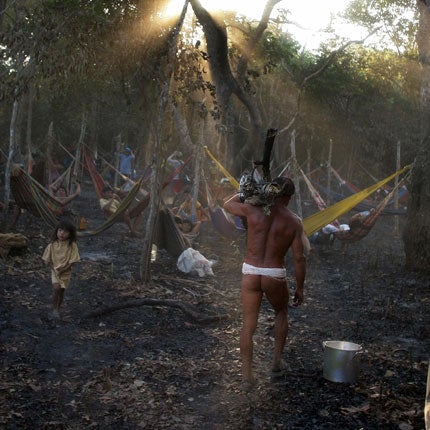Sarah Barrell: In the Amazon, you can't see the trees for the wood
Travel Notes

Your support helps us to tell the story
From reproductive rights to climate change to Big Tech, The Independent is on the ground when the story is developing. Whether it's investigating the financials of Elon Musk's pro-Trump PAC or producing our latest documentary, 'The A Word', which shines a light on the American women fighting for reproductive rights, we know how important it is to parse out the facts from the messaging.
At such a critical moment in US history, we need reporters on the ground. Your donation allows us to keep sending journalists to speak to both sides of the story.
The Independent is trusted by Americans across the entire political spectrum. And unlike many other quality news outlets, we choose not to lock Americans out of our reporting and analysis with paywalls. We believe quality journalism should be available to everyone, paid for by those who can afford it.
Your support makes all the difference.Money does grow on trees...or at least under them. The Amazon has featured a good deal in the news in recent weeks, most stories examining the value of the world's largest rainforest if denuded as agricultural land or penetrated for oil or gas.
In The Independent last week, Johann Hari looked at the situation in Ecuador, a poverty-stricken country that is asking world leaders to make good on old promises to pay half of what its 4,000 miles of pristine Amazon forest is worth in oil revenue, in order that it can afford to leave said oil in the ground.
Meanwhile, Brazil has changed conservation laws that govern farming in its lion's share of the Amazon. The most controversial of these allows small-scale farmers to be exempt from replanting deforested land. In the year that it's taken for this ruling to be debated, Amazon deforestation has increased six-fold, many believe fuelled by its promise of amnesty for previously farmed land.
But these stories get brushed aside: "old" news of deforestation consigned to the passe pile of platitudes alongside "save the whale" and "stop global warming". But I took a "tabaco" flight last week, a small tube of a plane from Leticia in the Colombian Amazon, to Bogota, where it was impossible to ignore the reality.
During this two-hour ride over a thick-pile carpet of mesmerising green-on-green, I spoke to a travel guide who had done an MSc in Environmental and Resource Management. In other settings these worthy sounding words might have caused instant narcolepsy in this air passenger, but with the trees breathing life into the skies around us, I paid rapt attention.
My co-passenger, one Jorge Triana, had just completed his WWF-sponsored thesis on the value of the Brazilian Amazon to Dutch investors. Like Stanford professors and altruistic economists before him, Jorge had used a complex set of mathematical tools to look at patterns of deforestation, degradation and trends in conservation. And, like many before him, he had come to a figure that showed, dramatically, how many times more valuable the Amazon is to humanity if we don't chop it down. We need long-term investment, rather than a slash, stash and spend mentality: a simple formula no one seems willing to bank on.
Is this where tourism can lend a small hand? True, we need to burn fossil fuels to get visitors into the Amazon, but with advances in biofuel planes and the possibility of carbon off-setting (which would ideally come out of the huge taxes we now pay on top of our airfares), it seems to me that tourists can bring more to a region than they take away.
In Colombia's little-visited Amazon, I stayed in rural maloca (traditional community huts) sleeping in hammocks and travelling on foot with a local guide. Small-scale tourism initiatives like this won't ever deliver the dollars that logging, soy or cocaine production do but, if done carefully, they offer Amazon communities viable, sustainable and legal ways to earn a living that focus entirely on keeping the forest intact. And they offer visitors first-hand insight into an incredible part of the world that has been reduced, for many, to just another complex debate.
Do you have a travel issue? Email sundaytravel@independent.co.uk
Join our commenting forum
Join thought-provoking conversations, follow other Independent readers and see their replies
Comments